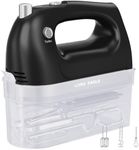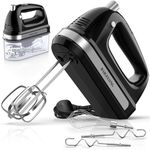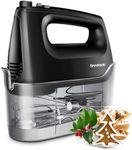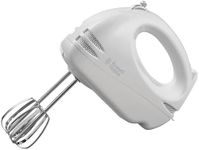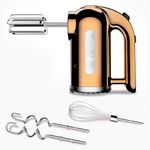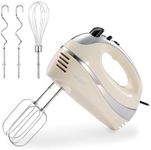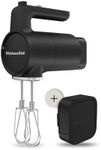Buying Guide for the Best Hand Mixers
When choosing a hand mixer, it's important to consider how often you'll use it and what types of recipes you'll be preparing. Hand mixers are versatile kitchen tools that can handle a variety of tasks, from whipping cream to mixing dough. The right hand mixer for you will depend on your cooking habits and the specific features that will make your mixing tasks easier and more efficient.Power (Wattage)The power of a hand mixer is measured in watts and indicates how strong the motor is. A higher wattage means the mixer can handle thicker batters and doughs more easily. Hand mixers typically range from 100 to 250 watts. If you plan to use your mixer for light tasks like whipping cream or mixing cake batter, a lower wattage will suffice. However, for heavier tasks like kneading dough, a higher wattage is preferable to ensure the mixer doesn't struggle or overheat.
Speed SettingsSpeed settings on a hand mixer allow you to control how fast the beaters move. Most hand mixers come with at least three speeds, but some offer up to nine. More speed options give you greater control over the mixing process, which is important for achieving the right consistency in your recipes. If you frequently make recipes that require precise mixing, such as meringues or delicate batters, look for a mixer with more speed settings. For general use, three to five speeds are usually sufficient.
WeightThe weight of a hand mixer affects how comfortable it is to use, especially for extended periods. Lighter mixers are easier to handle and maneuver, which is important if you plan to use the mixer frequently or for long mixing sessions. However, very lightweight models might not be as durable. Consider how long you'll typically use the mixer at one time and choose a weight that feels comfortable for you.
AttachmentsAttachments for hand mixers can include beaters, dough hooks, and whisks. The type and number of attachments can expand the versatility of your mixer. Standard beaters are suitable for most tasks, while dough hooks are useful for kneading bread dough, and whisks are ideal for whipping cream or egg whites. Consider what types of recipes you make most often and choose a mixer with the appropriate attachments to meet your needs.
Ease of CleaningEase of cleaning is an important factor to consider, as it affects how often you'll want to use your mixer. Look for models with detachable, dishwasher-safe attachments to make cleaning easier. Some mixers also have smooth surfaces and fewer crevices, which can help prevent food from getting stuck and make wiping down the mixer simpler. If you value convenience, prioritize a model that is easy to clean.
Corded vs. CordlessHand mixers come in both corded and cordless models. Corded mixers provide consistent power and are generally lighter, but they require an outlet and can be less convenient to maneuver. Cordless mixers offer more flexibility and portability, allowing you to mix anywhere in the kitchen, but they may have limited battery life and can be heavier due to the battery. Consider where and how you'll use the mixer to decide which type is best for you.
